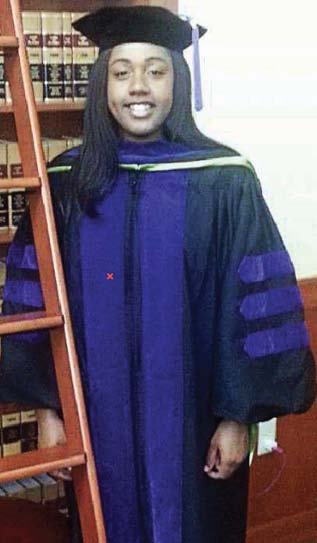 Racquell Perry, a former foster child and newly-minted lawyer, is on a mission.
Racquell Perry, a former foster child and newly-minted lawyer, is on a mission.
The 26-year-old earned a bachelor’s degree in criminal justice from Florida Agricultural and Mechanical University (FAMU) in Tallahassee in just three years, a law degree from FAMU three years later and soared past the Florida bar exam last month.
What’s her new quest? To help other young people from foster care, and the adults involved in their lives, learn about campus-based programs to help former foster youth excel in college.
“Growing up I was surrounded by poverty, and I was not happy about how things were going, but I knew education was my ticket out,” Perry said. “I went to Tallahassee on my own, but I had a mentor who helped me get through my undergraduate education, encouraged me and even gave me a job when I needed it.”
Perry will share her story of trial and triumph during a workshop on education and the law at the Third Annual Florida Reach Symposium, scheduled for 8 a.m. – 4:30 p.m., June 9 and 10, at Miami-Dade College’s North Campus and the Florida International University Modesto A. Maidique Campus in South Miami-Dade County.
The free conference is being sponsored by Educate Tomorrow, the mentoring program through which Perry obtained her mentors and for which she currently works as a graduate fellow.
“It is exciting that within weeks of passing the bar Racquell is already able to lead a session on legal issues and education and give back to the community with such important information,” said Brett McNaught, CEO of Educate Tomorrow. “Everyone who attends this conference will hear stories like Racquell’s but also about the many challenges faced from young adults from foster care as they pursue their education after high school.”
Florida Reach
Florida Reach is a network of education and child welfare professionals, foster care alumni, foster parents and guardians, and educational advocates from throughout Florida. The group meets online once a month to learn about strategies that promote educational success for youth who grew up away from their biological families. Some of these young adults receive fee exemptions that allow them to attend public colleges and universities in Florida at no cost. Approximately 2,000 students who emancipated from foster care are receiving a free post-secondary education in Florida, according to Becky Pengelley, a Florida Reach co-founder and former statewide director of the Florida Department of Children and Families (DCF) College Coach program.
DCF established the college coach program and supports the Florida Reach Network because, despite free tuition, former foster children graduate at lower rates than their peers, said Pengelley, now the executive director of the Palmer Monroe Teen Center in Tallahassee.
“Depending on the age group examined and particular study, between one percent and 11 percent of all foster youth have graduated from college,” Pengelley added. “Compare that to the 38 percent of adults age 25-29 who have earned a two-year college degree or higher.”
The statistics Pengelley cited come from a 2009 study from the University of Chicago and U.S. Census data cited in a 2016 article published by the Juvenile Law Center in Philadelphia.
Educational topics
At the Florida Reach Symposium, between 80 and 100 members of Florida Reach and guests will learn about effective programs that are supporting these emerging adults.
The symposium will start off with a presentation by members of Florida Youth Shine, a statewide youth-driven, peer-led organization that empowers current and former foster youth to become leaders and advocates. Other topics planned for June 9 include housing, K-12 education issues and college-based support programs such as the Educate Tomorrow at Miami-Dade College Single Stop Program.
On Friday, June 10, the itinerary will include sessions on university campus support programs, such as the FIU Fostering Panther Pride Program, as well as nutrition and health (including mental health), legal issues and community partnerships.
As in years past, the conference is expected to draw participants from South Florida, Orlando, Tampa, Tallahassee, and other parts of Florida. A high number of attendees from Broward and Palm Beach counties are expected, including representatives from faith-based programs that focus on foster children.
“We really want to spread Florida Reach’s message and mission to anyone working to support foster youth,” said Joe Murray, a co-founder of Florida Reach and Ohio Reach and director of University Advising Services at FAU. “The symposium is an opportunity to learn about campus-based programs effectively serving these resilient young people and connecting resources across organizations.”
As an example of how resiliency can triumph over trials, Perry, the FAMU graduate, hopes her story and the training she has prepared will motivate conference attendees to join the cause.
“Often we hear about the few people or the one person, like me, who graduates,” she said. “The bigger story is that too many of us don’t ever graduate. I have younger brothers and sisters coming up, so I want to help improve the statistics.”
For more information about the Florida Reach Symposium, email [email protected].
Dr. Steve J. Rios, a long-time mentor and youth advocate, is president of Rios Research & Evaluation and a co-founder of Florida Reach. He can be reached at [email protected]

Comments